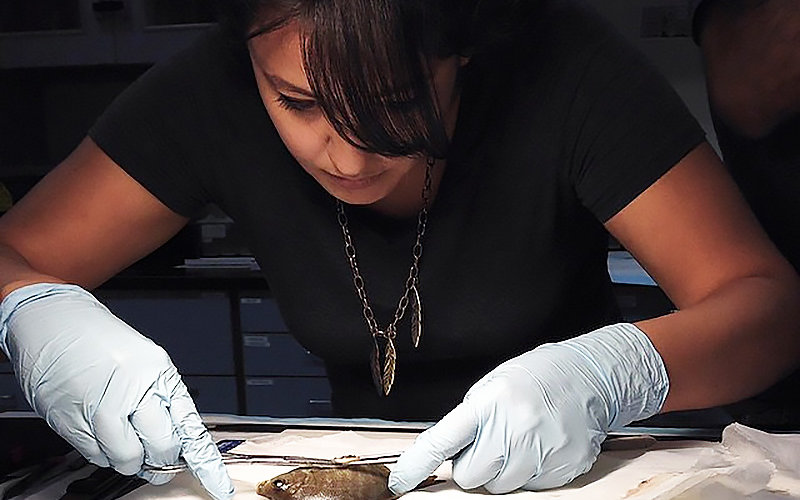
Cal State Fullerton graduate student Evelyn Bond is studying the reproductive physiology of surfperches, a unique group of fishes that reproduce through internal fertilization.
Alumna Alyssa Garcia, who earned her bachelor’s degree in physics in 2017 and conducted groundbreaking gravitational-wave research as an undergraduate, is pursuing a doctorate in physics at Brandeis University near Boston.
What the two future scientists have in common is each has been awarded a National Science Foundation Graduate Research Fellowship to support their master’s or doctoral degree research and training in STEM — science, technology, engineering and mathematics — fields.
The prestigious fellowship provides three years of financial support within a five-year fellowship period — a $34,000 annual stipend and $12,000 cost-of-education allowance to the graduate institution. The awardees were selected from more than 12,000 applicants from across the country.
“Being awarded the fellowship means that my master’s degree will be fully paid so that I do not have to apply for student loans or go into debt for my graduate degree,” said Bond, who plans to finish her master’s program in 2021 and then pursue a doctorate. “I will also be able to focus on my education and research instead of seeking outside employment.”
Bond earned her bachelor’s degree in biological science-marine biology in 2016 and was a scholar in the Southern California Ecosystems Research Program. She studied the reproductive biology of male black perch under the mentorship of Kristy L. Forsgren, associate professor of biological science, also her graduate mentor. As an undergraduate, she presented her research at local and national scientific conferences and co-authored a journal paper in The Bulletin of the Southern California Academy of Sciences.
“Dr. Forsgren has been a huge part of my academic success. I came into her lab as an inexperienced undergraduate student. She has provided me with guidance and support, but most importantly, she believed in me when I didn’t believe in myself,” Bond said. “She has motivated me to reach higher than I could have ever imagined. My confidence as a Mexican-American woman in the field of science has significantly grown.”
Through her current research project on surfperches, Bond hopes to contribute to the greater scientific community by expanding knowledge about fish reproductive anatomy and physiology.
“Specifically, I am discovering and understanding more about reproductive structures in surfperches, which have not been previously described,” she said.
Garcia worked in the lab of Geoffrey Lovelace, associate professor of physics, as part of CSUF’s Gravitational-Wave Physics and Astronomy Center (GWPAC), where she conducted simulations of binary black hole mergers and analyzed resulting gravitational waves. She was part of the CSUF faculty-student research team that contributed to the Laser Interferometer Gravitational-wave Observatory (LIGO) first-ever discovery of gravitational waves from the collision of two black holes, announced in 2016.
She also presented her research at conferences, including in Scotland, and co-authored a journal paper in Classical and Quantum Gravity. Garcia also was a research scholar in the Louis Stokes Alliances for Minority Participation (LSAMP) program.
“I believe that my research at CSUF is a huge part of why I received the fellowship. Having worked in the GWPAC for about three years taught me so much about what it’s like working in large collaborations and how to work at problems that potentially no one has answered before,” said Garcia, whose doctoral research focuses on dark energy and why it’s causing the expansion of the universe to accelerate.